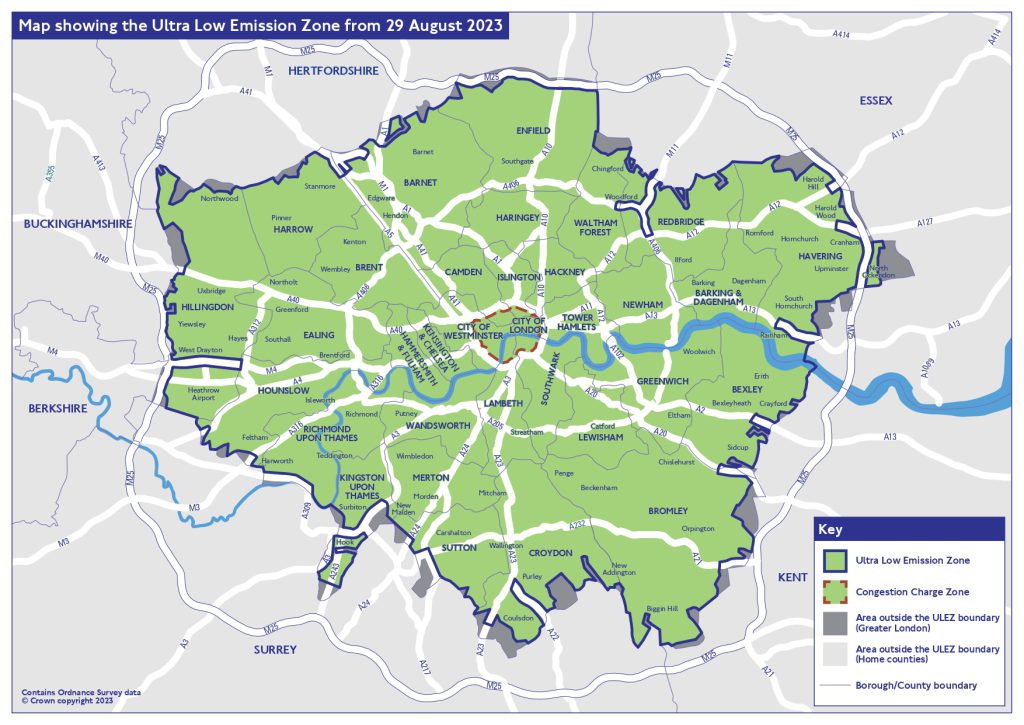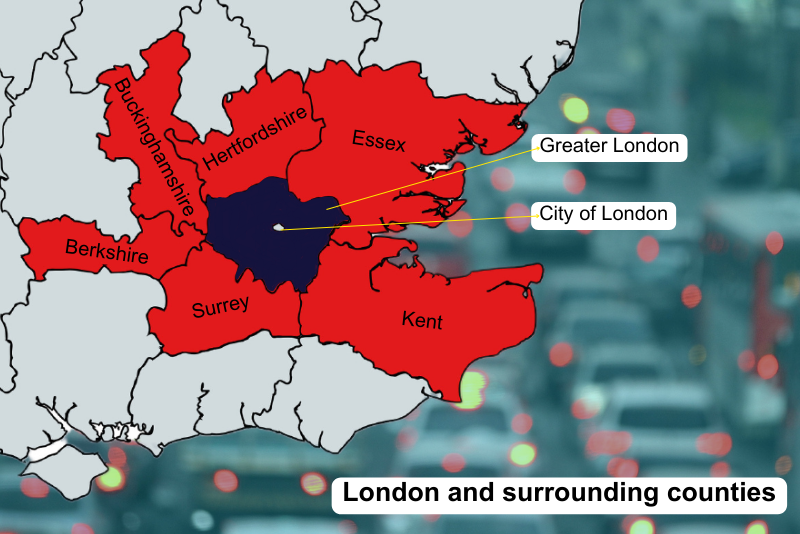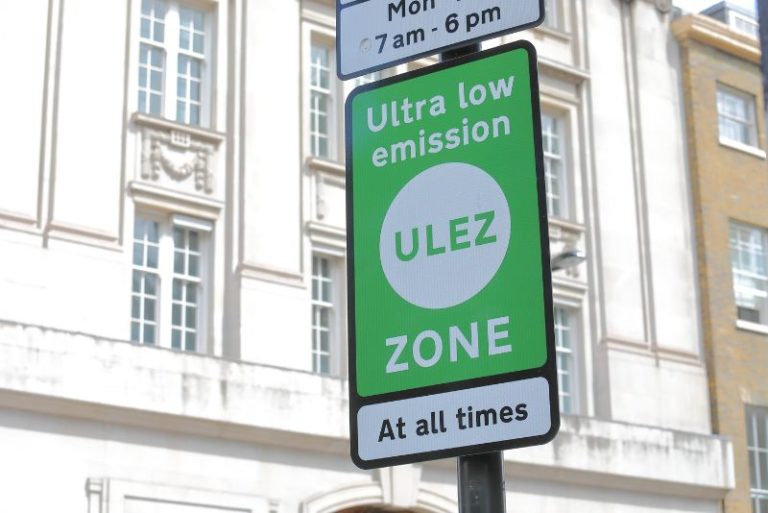Before 2023, Tuesday 29th August was simply the day after the August Bank Holiday, associated either with a return to work after a long weekend or for the lucky ones, being on a well-deserved summer break. Now, however, it’s got new meaning: ‘ULEZ day’.
As of this date, the Ultra Low Emissions Zone (ULEZ) has been expanded and now applies to all London boroughs, bringing 5 million more people into the scheme – but not without controversy. There’s no denying that measures are needed to reduce emissions and fuel consumption, to counter the Climate Crisis. ULEZ has been welcomed by those affected by air pollution and the associated health risks. Yet, others have raised concerns about how the charges will impact their business, particularly following the impact of the pandemic on small businesses, and now the cost-of-living inflation crisis.
For businesses in and around London, or those travelling there for a job, it’s vital you understand ULEZ and the effects it will have on your trade. So buckle up, as we explore this new system.
What is ULEZ?
ULEZ is a scheme introduced to create cleaner, healthier air in and around London. Vehicles must meet certain emission standards to drive in these areas freely, and if they aren’t compliant, drivers must pay a £12.50 daily charge – or face a £180 fine. The scheme has been around for a few years now, covering the same central area as the Congestion Zone, before widening out to the North and South Circular roads in 2021.

Generally speaking, petrol cars registered after 2005, and diesel cars newer than September 2015 will meet the emissions standards. Buses, coaches and minibuses over 5 tonnes Gross Vehicle Weight (GVW) do not need to pay the ULEZ charge, and nor do the following vehicle types over 3.5 tonnes GVW:
- HGVs
- Lorries
- Vans
- Motor caravans
- Motorised horseboxes
- Breakdown and recovery vehicles
- Snow ploughs
- Gritters
- Refuse collection vehicles
- Road sweepers
- Concrete mixers
- Fire engines
- Tippers
- Removal lorries
- Other specialist vehicles
But it’s always worth checking to see if your vehicle is compliant. Remember, just because your vehicle meets the ULEZ standards, that doesn’t necessarily mean you’re off the hook. You may still need to pay the Congestion Charge – see what that means for your vehicle and journey here.
It may seem like an inconvenience, but London’s busy roads product almost 50% of the city’s air pollution. What’s more, an estimated 4,000 London residents died prematurely in 2019 through illness linked to long-term exposure to dirty air. High levels of nitrogen dioxide (NO2) and particulates can cause and worsen breathing problems like asthma, and also affect people with heat conditions. And research has shown ULEZ is working. By October 2022, NO2 levels next to the roadside had dropped by 46% in central London.
For many, this positive impact of ULEZ is heartening. But what if your vehicle isn’t compliant? Roughly these vehicles will be non-compliant:
- Motorbikes that do not meet Euro 3 standards (pre-2007 models)
- Petrol cars and vans that do not meet Euro 4 standards (pre-2006 vehicles)
- Diesel cars and vans that do not meet Euro 6 standards (pre-2015 vehicles)
- Buses, coaches and lorries will need to meet or exceed the Euro VI standard, or pay £100 a day to drive within the zone
If you’re reliant on your vehicle for business in and around London, an extra daily charge of £12.50 or £100 is going to eat into your earnings. Combine this with the higher cost of fuel and car insurance at the minute, and it’s yet another pressure on your trade.
Well, the Government has set up a scrappage scheme. If you live in a London borough, you can claim from the £160m scheme, which is operating on a first-come, first-serve basis. Londoners with non-compliant vehicles can claim a maximum of:
- Cars: £2,000
- Vans: £7,000
- Small businesses (fewer than 50 employees) and sole traders with vans: £7,000 per vehicle (up to three)
- Charities with a registered address in London that use a minibus: £9,000 per vehicle (up to three)
- Disabled Londoners with wheelchair-adapted vehicles: £10,000
- Retrofitting a vehicle: £6,000
Don’t miss out: Self-employed drivers can claim tax relief on the daily ULEZ charge, as can employees with non-compliant vehicles, if their journey was “exclusively for the purposes of the trade”.
Additionally, the ULEZ scheme allows for some vehicles to retrofit emissions reduction technology in order to meet the standards. This technology needs to be certified by the government’s Clean Vehicle Retrofit Accreditation Scheme (CVRAS). Currently CVRAS has emissions reduction technologies certified for vans, minibuses, motorhomes, buses, coaches, HGVs and refuse vehicles. Once certified, you should notify TfL directly. The Energy Savings Trust has even more details on the retrofit accreditation process.
Emission impossible?
It’s clear that the government has created incentives to make this transition to ULEZ easier for drivers in London. However, many business owners have spoken out about the knock-on effect the scheme has on them.
Many businesses in Essex, Kent and Surrey, and other surrounding areas, have a client-base in London. They will now be subject to the ULEZ charges but cannot apply to the scrappage scheme unless they live in a London borough. If you’re in this scenario and have a non-compliant vehicle, you either have to take on the daily charge, or fork out for a new vehicle that meets the standards. Several businesses have already said they will have to up their prices in light of the extra ULEZ cost, but are aware that customers may not react positively to this cost increase.

Watch out for sustainability scammers!
It’s a sad fact of life that whenever a new scheme or system is introduced, there are scammers out there looking to exploit it. And, unfortunately new spoof ULEZ payment websites have already cropped up, scamming people out of their hard-earned cash.
Fake websites such as ‘ulez.emission[dot]london’ and ‘emissioncharge[dot]london’ appear when you search ‘pay for ULEZ’ or ‘ULEZ’. But the money is not passed on to the transport authority, so there’s no record that the drivers who use these scam websites have paid the fee.
So then making matters worse, those who fall for the copycat scams have then also had to pay the ULEZ penalty fine for “failing to pay” – even though they had all the intentions of following the new rules and tried to pay.
If you do accidentally share your card details on unofficial website to pay the ULEZ charge, contact your bank immediately to ensure that it blocks any recurring payments. If the payment has already left your account, ask your card provider for a full refund. Credit card payments have strong legal protection, but banks can also use chargeback to reverse payments if you used a debit card or prepaid card.
Remember – drivers should only be paying £12.50 for the ULEZ charge via TfL’s website.
Where are other Clean Air Zones in the UK?
While ULEZ has been talked about lots recently, it’s not the only Clean Air Zone in the UK. Many other cities currently have a version in operation, including:
- Bath
- Birmingham
- Bradford
- Bristol
- Greater Manchester (under review)
- Portsmouth
- Sheffield
- Tyneside – Newcastle and Gateshead
You can check if your vehicle is compliant on the Government website here. Liverpool, Southampton, Derby, Leeds, and Nottingham have all looked at introducing CAZ policies, so it’s likely most people will be affected in some shape or form, whether it’s simply passing through a city or traversing it on a regular basis.
From transport to tools, we’ve got you covered
We know how important it is to have the right levels of cover to ensure your livelihood is protected – at a price that fits your budget. That’s why our expert advisors are on-hand to help save you time and money. And, in the event that you need to make a claim, we’re with you all the way, making the process as straightforward and swift as possible.
Our specialist commercial team is always happy to answer any questions you may have. Find your nearest branch and talk with one of our expert advisors.
Sources: BBC, Evening Standard, World Economic Forum, Which?

